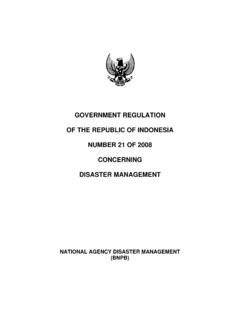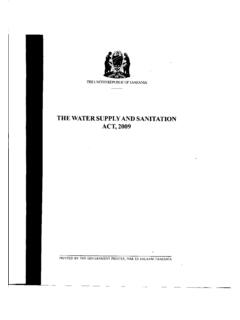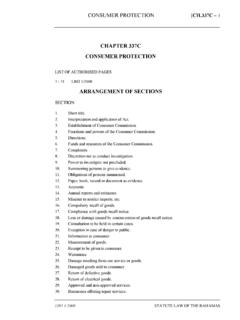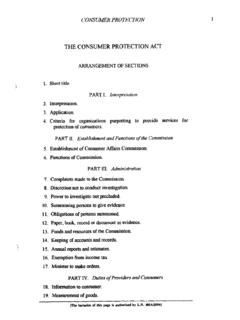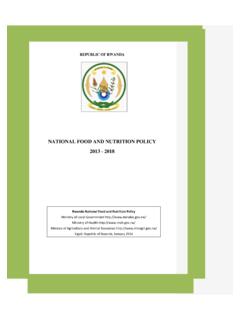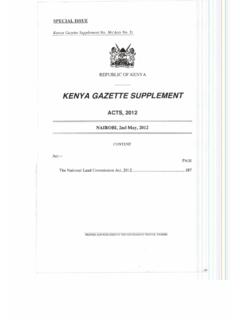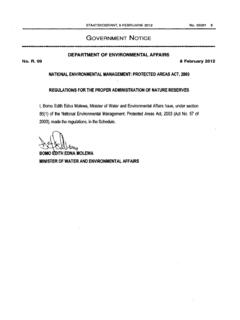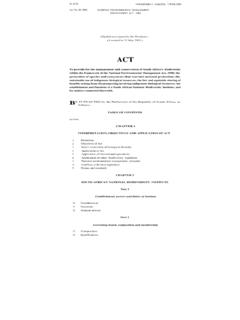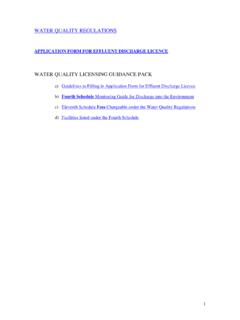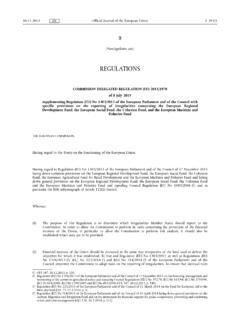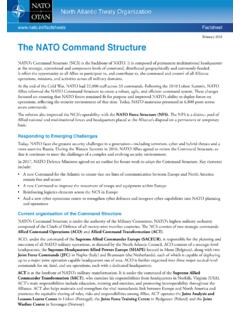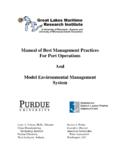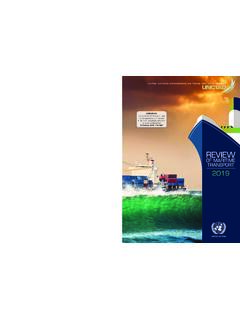Transcription of Maritime (ISPS Code) Regulations 2014
1 717 [LEGAL NOTICE No. 102] Maritime TRANSPORT DECREE 20 I 3 (DECREE No. 20 OF 2013) Maritime (ISPS code ) Regulations 2014 TABLE OF PROVISIONS PART I -PRELIMINARY I. Short title and commencement 2. Purpose 3. Interpretation 4. Application PART 2-RESPONSIBILITY OF THE AUTHORITY 5. Certificate of Compliance 6. Offences and penalties 7. Responsibilities of the Authority 8. Declaration of Security PART 3-RESPONSIBILITY OF SHIPPING COMPANIES AND SHIPS 9. Obligation of the Company 10. Ship Security I I. Master's discretion 12. Ship Security Assessment 13. Ship Security Plan 14. Records and audits 15. Audits 16. Company Security Officer 17. Ship Security Officer 18. Training Drills and Exercise on ship security PART 4-REQUIREMENTS FOR RECOGNISED SECURITY ORGANISATION 19.
2 Recognised Security Organisation PART 5-REQUIREMENTS FOR PORT FACILITIES 20. Port facility security 21. Port facility security assessment 22. Port facility security plan 23. Port facility security officer 24. Port security conunittee 25. Security personnel 26. Training, drill, exercises on port facility security 27. Records, audits, review and amendments PART 6-CERTIFICATION OF SHIPS 28. Verification and certification for ships 29. Issue or endorsement of certificate 718 30. Duration and validity of certificate 31. Interim certification PART 7 -MISCELLANEOUS 32. Repeal SCHEDULES-Schedule 1 ~ International Ship Security Certificate Schedule 2-Interim International Ship Security Certificate Schedule 3 -Declaration of Security Schedule 4-Statemcnt of Compliance of a Port Facility Schedule 5-0ffences and Penalties Schedule 6-Fees and Charges IN exercise of the powers conferred upon me by section 240( 1 )(x) of the Maritime TranspOlt Decree 2013, I hereby make these Regulations -PART I -PRELIMINARY Shorl tille (llId cOll/mencement I.)
3 These Regulations may be cited as the Maritime (ISPS code ) Regulations 2014 and shall come into force on 1st JanuaJ)l, 2015. Purpose ( 1) The objective of these Regulations is to establish a national framework amongst government agencies, the Authority and the shipping and port industry to detect, access and take preventative measures against security threats or incidents affecting ships or port facilities in Fiji used in international trade. (2) These Rcgulations-(a) establish the respective roles and responsibilities of all parties concerned for ensuring Maritime security, and the early and efficient collation and exchange of security related information; and (b) provide the methodology for security assessments for plans and procedures to counter changing security levels in Fiji.
4 Interpretation 3.~(l) In these Regulations , unless the context otherwise requires,-"Authority" means the Maritime Safety Authority of Fiji; "Administration" means the government of the State whose Flag the ship is entitled to fly; "Chief Executive Officer" means the Chief Executive Officer of the Authority unless expressly provided otherwise in these Regulations ; "Chapter" means a chapter of the Convention; "Company" means the owner of the ship or any other organisation or person such as the manager, or the bareboat chat1erer, who has assumed the responsibility 719 for operation of the ship from the ship owner and who, on assuming slIch responsibility, has agreed to take over all duties and responsibility imposed by these Regulations and the code ; "CSO" means the Company Security Officer designated by the Company for ensuring that a ship security assessment is can-jed out; that a SSP is developed, submitted for approval, and thereafter implemented and maintained and for liaison with PFSOs and the SSO.
5 "Convention" means the International Convention for the Safety of Life at Sea, 1974 as amended; " code " means the International Ship and Port Facility Security code , and includes amendments made to it from time to time; "Decree" means the Maritime Transport Decree 2013; "Declaration of Security" means an agreement reached between a ship and either a port facility or another ship with which it intelfaces specifying the security measures each will implement; "Mobile offshore drilling unit" means a mechanically propelled mobile offshore drilling unit, as defined in Chapter IXiI of the Convention; "Port Facility" means a location, as determined by the Authority, where ship/port interface takes place, and this includes areas such as anchorage, waiting berths and approaches from seaward; "PFSO" means the Port Facility Security Officer designated as responsible for the development, implementation, revision and maintenance of the PFSP and for liaison with the SSOs and CSOs; "PFSP" means the Port Facility Security Plan developed to ensure the application of measures designed to protect the port facility and ships, persons, cargo, cargo transport units and ship's stores within the port facility from the risks of a security incident.
6 URSa" means a Recognised Security Organisation with appropriate expertise in security matters and with appropriate knowledge of ship and port operations authorised to carry out an assessment, or a verification, or approval or certification activity required by these Regulations and the code ; "Security incident" means any sllspiciolls act or circulllstance threatening the security of a ship, including a mobile offshore drilling unit and a high speed craft, or of a port facility or of any ship/port interface or any ship to ship activity; "Security level" means the qualification of the degree of risk that a security incident will be attempted or will occur; "Security level 1 n (Normal) means the level at which the ship or port facility normally operates with minimum appropriate protective security measures; 720 "Security level 2" (Heightened) means the level applying for as long as there is a heightened risk of a security incident for which appropriate additional protective security measures shall be maintained; "Security level 3" (Exceptional) the level applying for the period of time when there is the probable or imminent risk of a security incident for which further specific protective security measures shall be maintained.
7 "SSO" means the Ship Security Officer on board the ship, accountable to the masterl designated by the Company as responsible for the security of the ship, including implementation and maintenance of the SSP and for liaison with the CSO and PFSOs; "SSP" means the Ship Security Plan developed to ensure the application of measures on board the ship designed to protect persons on board, cargo, cargo transport units, ship's stores or the ship from the risks of a security incident; "Ship to Ship activity>! means any activity not related to a port facility that involves the transfer of goods or persons from one ship to another; "Ship to Port Interface" means the physical, operational, or notional location in which ships and supporting watercraft engage port facility services.
8 (2) The term "ship", when used in these Regulations and the code , includes mobile offshore drilling units and high-speed craft as defined in Chapter XI-21l. (3) The term "Contracting Government" in connection with any reference to a port facility, when used in these Regulations , includes a reference to the "Administration". (4) Terms not otherwise defined in these Regulations shall have the same meaning as the meaning attributed to them in Chapters I and XI-2. Application (1) These Regulations apply 10-(a) the following types of ships engaged in international voyages-(i) passenger ships, including high-speed passenger craft; (ii) cargo ships, including high-speed craft, of 100 gross tonnage and upwards; (iii) Fiji ships engaged in international voyages, any ships returning from the high seas and foreign flagged ships in Fiji waters or intending to proceed to a port or facility in Fiji that is subject to these Regulations ; (iv) mobile offshore drilling units; and (b) port facilities serving such ships engaged in international voyages.
9 (2) These Regulations do not apply to warships, naval auxiliaries or other ships owned or operated by a Contracting Government and used only on Government non-commercial service. 721 (3) Notwithstanding sub-regulation (I), the Authority shall decide the extent of application of these Regulations to port facilities within Fiji which, although used primarily by ships not engaged in international voyages, which arc also required, occasionally, to serve ships arriving or departing on an international voyage. (4) The Authority shall base its decision, on a port facility security assessment carried out in accordance with these Regulations . (5) Any decision which the Authority makes shall not compromise the level of security intended to be achieved by Chapter XI-2 as amended or by these Regulations .
10 (6) Regulations 8 to 18 and 28 to 31 shall apply to companies and ships as specified in Chapter XI-214. (7) Regulations 8 and 20 to 27 shall apply to port facilities as specified in Chapter XI-2/l0. (8) Nothing in these Regulations shall prejudice the rights or obligations of the Republic of Fiji under international law. PART 2-REPONSIBILITY OF THE AUTHORITY Certificate oj Compliance ( I) The Authority may, upon application and after assessing and verifying a ship, port or port facility under Article 3 of the code , issue a cCl1ificate of compliance to the ship or port or port facility as prescribed in the code . (2) The applicant for a certificate of compliance shall pay the fees to the Authority as prescribed in Schedule 2.
